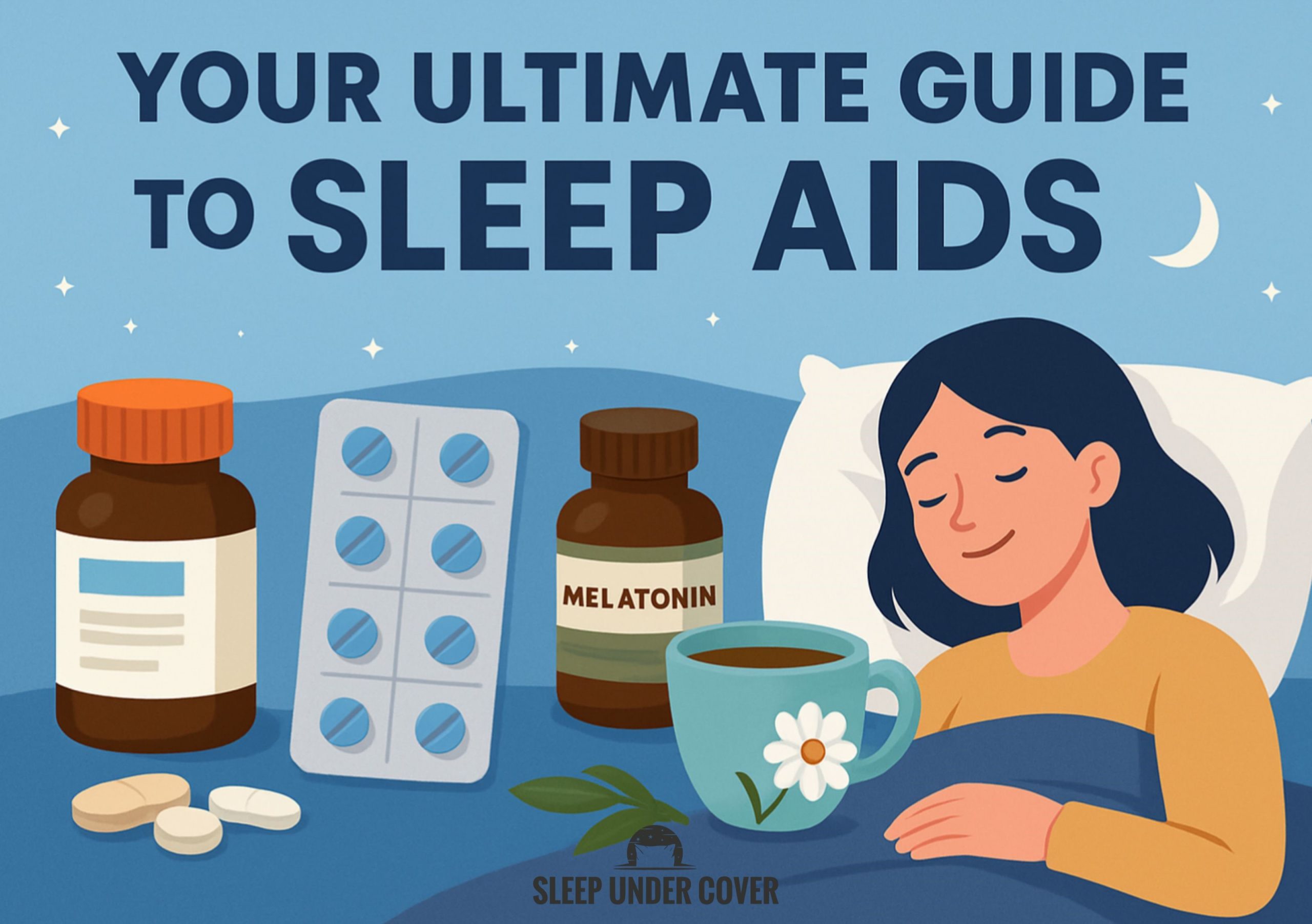- Introduction
- The Benefits of Sleep Aids
- Prescription Sleep Aids: A Gentle Boost
- Over-the-Counter Options: Accessible and Effective
- Natural Sleep Aids: Nature’s Embrace
- The Role of Sleep Hygiene
- Creating a Bedtime Routine
- The Science Behind Sleep Aids
- Choosing the Right Sleep Aid
- Safety First: Using Sleep Aids Wisely
- The Emotional Benefits of Better Sleep
- Addressing Common Sleep Challenges
- Sleep Aids for Specific Groups
- The Future of Sleep Aids
- Combining Sleep Aids with Therapy
- The Role of Diet in Sleep
- Exercise: A Natural Sleep Booster
- The Social Connection to Sleep
- Traveling and Sleep Aids
- Sleep Aids and Mental Clarity
- Building Confidence in Sleep Aids
- Celebrating Small Sleep Victories
- A Holistic Approach to Sleep
- Conclusion: Your Journey to Restful Sleep
Introduction
Sleep is a vital ingredient for a vibrant, healthy life. Indeed, a good night’s rest boosts energy, sharpens focus, and uplifts mood. However, many people occasionally struggle to fall asleep or stay asleep. Fortunately, sleep aids—ranging from medications to natural remedies—offer promising solutions. This guide explores how sleep aids can support restful sleep, empowering you to wake up refreshed and ready to thrive.
Moreover, understanding sleep aids helps you make informed choices. Whether you’re dealing with temporary sleeplessness or seeking long-term solutions, this article provides encouraging insights. With a positive approach, let’s dive into the world of sleep aids and discover how they can enhance your well-being.
The Benefits of Sleep Aids
Sleep aids are designed to help you drift off faster and enjoy deeper rest. They include prescription medications, over-the-counter options (OTC), and natural supplements. Consequently, these tools can be a game-changer for those facing occasional sleep challenges. By promoting relaxation, they pave the way for restorative sleep.
Additionally, sleep aids can improve your daily life. A well-rested mind is more creative and productive. Therefore, using sleep aids thoughtfully can lead to brighter mornings and more fulfilling days. Let’s explore the different types of sleep aids and their unique benefits.
Prescription Sleep Aids: A Gentle Boost
Prescription sleep medications, like zolpidem (Ambien) or eszopiclone (Lunesta), are often recommended for short-term sleep issues. These medications calm the nervous system, helping you fall asleep quickly. As a result, they’re ideal for temporary disruptions, such as stress or travel-related sleeplessness.
However, these medications work best under medical guidance. Doctors tailor prescriptions to your needs, ensuring safe and effective use. Thus, consulting a healthcare provider is a smart step toward better sleep. With their support, prescription aids can be a reliable ally.
Over-the-Counter Options: Accessible and Effective
For those seeking milder solutions, over-the-counter (OTC) sleep aids are widely available. Antihistamines, such as diphenhydramine (Benadryl) or doxylamine (Unisom), are common choices. These medications promote drowsiness, making it easier to fall asleep. Consequently, they’re a convenient option for occasional sleepless nights.
Furthermore, OTC aids are easy to find at pharmacies. They’re designed for short-term use and can provide quick relief. However, reading labels and following dosage instructions is essential. This ensures you use them safely and enjoy their benefits.
Natural Sleep Aids: Nature’s Embrace
Natural sleep aids, like melatonin or valerian root, offer a gentle approach to better sleep. Melatonin, a hormone, regulates your sleep-wake cycle. Taking it as a supplement can help you fall asleep faster. Similarly, valerian root promotes relaxation, easing you into slumber.
Natural remedies often have fewer side effects. They’re a popular choice for those preferring holistic solutions. For example, chamomile tea or lavender essential oils can create a calming bedtime routine. These natural aids foster restful nights naturally.
The Role of Sleep Hygiene
While sleep aids are helpful, good sleep hygiene enhances their effectiveness. Simple habits, like maintaining a regular sleep schedule, create a sleep-friendly environment. Additionally, limiting screen time before bed reduces blue light1 exposure, which can disrupt sleep.
A cozy bedroom sets the stage for rest. A comfortable mattress and dim lighting signal your body to relax. By combining sleep aids with these practices, you maximize your chances of restful sleep. Small changes can make a big difference.
Creating a Bedtime Routine
A consistent bedtime routine signals your body that it’s time to wind down. For instance, reading a book or practicing gentle yoga can ease stress. Consequently, these activities prepare your mind for sleep, enhancing the effects of any sleep aid.
Moreover, routines don’t need to be complex. Even five minutes of deep breathing can work wonders. By incorporating calming activities, you create a positive sleep association. This makes falling asleep feel effortless and natural.

The Science Behind Sleep Aids
Understanding how sleep aids work can boost your confidence in using them. Prescription medications often target brain receptors to promote relaxation. For example, zolpidem2 enhances GABA activity3, calming neural activity. This helps you drift off smoothly.
On the other hand, OTC antihistamines block histamine, a wakefulness-promoting chemical. Natural aids like melatonin mimic the body’s own sleep signals. Thus, each type of sleep aid leverages science to support rest. Knowing this can make their use feel empowering.
Choosing the Right Sleep Aid
Selecting a sleep aid depends on your needs and lifestyle. For short-term issues, OTC options might suffice. However, chronic sleep problems may require a doctor’s input. Therefore, assessing your situation is key to finding the best solution.
Additionally, consider your preferences. If you lean toward natural remedies, melatonin or herbal teas could be ideal. Conversely, if you need stronger support, a prescription might be appropriate. Consulting a healthcare provider ensures you make the right choice.
Safety First: Using Sleep Aids Wisely
Safety is paramount when using sleep aids. Always follow dosage instructions for OTC and prescription medications. Moreover, avoid mixing sleep aids with alcohol, as this can amplify side effects. By using them responsibly, you maximize their benefits.
Furthermore, long-term use of some sleep aids may lead to dependency. However, short-term use is generally safe and effective. Discussing your plan with a doctor helps you avoid risks. This proactive approach keeps your sleep journey positive.
The Emotional Benefits of Better Sleep
Restful sleep does more than refresh your body; it uplifts your spirit. A good night’s rest reduces irritability and boosts optimism. Consequently, sleep aids can indirectly enhance your emotional well-being. Waking up refreshed feels like a gift.
Moreover, better sleep improves relationships. When you’re well-rested, you’re more patient and present. Thus, sleep aids contribute to a happier, more connected life. Their impact extends far beyond the bedroom.
Addressing Common Sleep Challenges
Many factors can disrupt sleep, from stress to caffeine. Fortunately, sleep aids can help manage these challenges. For instance, melatonin can reset your sleep cycle after jet lag. Similarly, OTC aids can ease occasional anxiety-related sleeplessness.
Additionally, lifestyle changes complement sleep aids. Cutting back on late-night snacks or exercising earlier in the day promotes rest. By combining these strategies, you tackle sleep issues from multiple angles. This holistic approach ensures success.
Sleep Aids for Specific Groups
Different groups have unique sleep needs. For older adults, melatonin is often recommended, as it’s gentle and effective. Meanwhile, younger adults might benefit from OTC antihistamines for occasional sleeplessness. Tailoring sleep aids to your age ensures optimal results.
Pregnant women or those with medical conditions should consult a doctor. Some sleep aids may not be suitable. However, safe options exist, and a healthcare provider can guide you. This personalized care fosters restful sleep.
The Future of Sleep Aids
Exciting advancements in sleep science are on the horizon. Researchers are exploring new medications with fewer side effects. Additionally, wearable devices can track sleep patterns, offering insights to improve rest. These innovations promise even better sleep solutions.
Moreover, natural remedies are gaining attention. Studies on herbs like ashwagandha4 show promise for relaxation. As science evolves, sleep aids will become more effective and accessible. This bright future inspires hope for restful nights.
Combining Sleep Aids with Therapy
For some, sleep issues stem from underlying concerns like anxiety. In these cases, cognitive behavioral therapy for insomnia (CBT-I) can be transformative. Pairing CBT-I5 with sleep aids creates a powerful combination. This approach addresses both symptoms and root causes.
Techniques like mindfulness or progressive muscle relaxation promote natural sleep. By integrating these with sleep aids, you build a sustainable sleep strategy. This empowers you to rest well consistently.
The Role of Diet in Sleep
What you eat affects how you sleep. A balanced diet supports healthy sleep patterns. For example, foods rich in magnesium, like almonds, promote relaxation. Similarly, tryptophan-rich foods, such as turkey, aid melatonin production.
Conversely, heavy meals or caffeine close to bedtime can disrupt sleep. Therefore, timing your meals wisely enhances sleep aid effectiveness. Simple dietary tweaks can amplify your rest, making sleep aids even more impactful.

Exercise: A Natural Sleep Booster
Regular exercise is a fantastic sleep enhancer. Physical activity reduces stress and tires the body naturally. As a result, it complements sleep aids beautifully. Even a brisk walk can improve sleep quality.
However, timing matters. Exercising too late in the day may energize you, delaying sleep. Thus, morning or afternoon workouts are ideal. By pairing exercise with sleep aids, you create a winning formula for rest.
The Social Connection to Sleep
Sleep impacts how you connect with others. A well-rested person is more engaged and empathetic. Consequently, sleep aids can strengthen your social bonds. Feeling rested makes interactions more enjoyable.
Moreover, sharing sleep tips with friends can build community. Discussing what works fosters mutual support. By prioritizing sleep, you nurture both personal and social well-being. Sleep aids play a key role in this cycle.
Traveling and Sleep Aids
Travel often disrupts sleep, whether due to jet lag or unfamiliar settings. Fortunately, sleep aids can ease these challenges. Melatonin is especially effective for adjusting to new time zones. It helps reset your internal clock.
Additionally, OTC aids can help you relax in new environments. Creating a portable bedtime routine, like using lavender oil, also helps. With sleep aids, you can enjoy restful sleep wherever you go.
Sleep Aids and Mental Clarity
Quality sleep sharpens your mind. It enhances memory, focus, and decision-making. Therefore, sleep aids indirectly boost cognitive performance. Waking up refreshed sets you up for success.
Furthermore, consistent rest reduces mental fog. Whether you’re studying or working, clear thinking is essential. By supporting sleep, these aids help you perform at your best. Their benefits ripple through every aspect of life.
Building Confidence in Sleep Aids
Trying sleep aids for the first time can feel daunting. However, starting with small steps builds confidence. For example, try a low dose of melatonin or a cup of chamomile tea. These gentle options ease you into the process.
Tracking your sleep can reinforce trust in sleep aids. Noting improvements in how you feel encourages continued use. With time, you’ll see sleep aids as reliable tools for restful nights.
Celebrating Small Sleep Victories
Every step toward better sleep is worth celebrating. Falling asleep faster or waking up refreshed are big wins. Sleep aids make these moments possible, boosting your motivation. Each restful night builds momentum.
Furthermore, sharing your progress with others can inspire them. Your journey to better sleep becomes a positive influence. By embracing sleep aids, you create a ripple effect of well-being.
A Holistic Approach to Sleep
Ultimately, sleep aids are part of a broader sleep strategy. Combining them with good habits maximizes their impact. For instance, a consistent schedule and a calming bedroom enhance their effectiveness. This holistic approach ensures lasting results.
Staying open to new solutions keeps your sleep journey dynamic. Whether it’s trying a new supplement or refining your routine, adaptability is key. With sleep aids as allies, you’re on the path to restful, rejuvenating nights.

Conclusion: Your Journey to Restful Sleep
Embarking on a journey to better sleep is empowering. Sleep aids offer a range of solutions, from medications to natural remedies. By exploring these options, you take control of your rest. Each choice brings you closer to vibrant health.
Additionally, support is always available. Doctors, pharmacists, and even friends can offer guidance. With sleep aids and a positive mindset, restful nights are within reach. Here’s to waking up refreshed and ready to shine!
Check out our other articles for the very latest Sleep Under Cover content.
- What’s Blue Light, and How Does It Affect Our Eyes?
- Zolpidem tartrate is a non-benzodiazepine receptor modulator primarily used in the FDA-approved short-term treatment of insomnia aimed at patients with difficulty falling asleep.
- GABA is an inhibitory neurotransmitter. It lessens a nerve cell’s ability to receive, create or send chemical messages to other nerve cells.
- Ashwagandha: Is it helpful for stress, anxiety, or sleep?
- Cognitive behavioral therapy for insomnia (CBT-I) is a short, structured, and evidence-based approach to combating the frustrating symptoms of insomnia.





